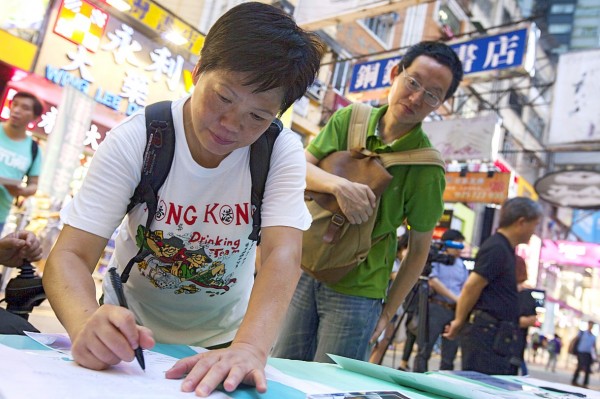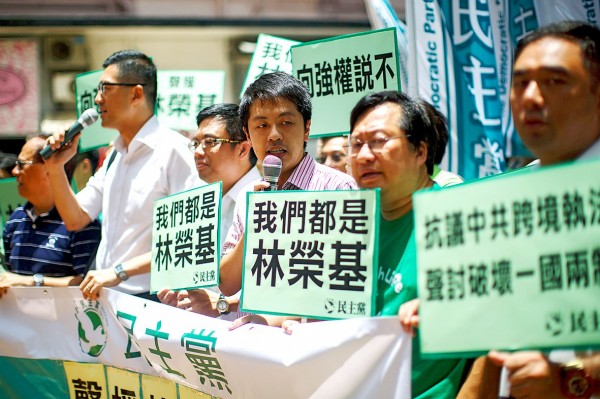《TAIPEI TIMES 焦點》 HK bookseller’s revelations deepen rift with Beijing

Members of the public sign a petition to denounce cross-border abductions and the false imprisonment of returned bookseller Lam Wing-kei, as well as to stand up for freedom of expression in Hong Kong, outside the Causeway Bay Books bookstore, Causeway Bay, Hong Kong, China, yesterday. Photo: EPA
ABDUCTION: Lam Wing-Kei said he was blindfolded for a 13-hour train ride to a city near Shanghai, where he was kept under surveillance and interrogated for five months
/ AP, HONG KONG
A Hong Kong bookseller’s revelation of months spent in harrowing detention by mainland Chinese authorities is inflaming tense relations between the semiautonomous territory and Beijing, with pro-democracy activists staging protests yesterday.
Lam Wing-kei’s (林榮基) account to reporters a day earlier directly contradicted the official version of events surrounding the disappearance of him and four other men linked to a Hong Kong publisher of banned books on China’s Communist leadership.
His detailed testimony supports widespread suspicions that the five were seized by Beijing authorities as part of a campaign to silence critical voices and had not willingly traveled to mainland China to voluntarily admit to crimes or help with investigations, as they had previously stated on Chinese TV.
The saga of the missing booksellers underscores growing fear in Hong Kong that Beijing is tightening its hold on the territory and eroding its considerable autonomy.
China took over control of Hong Kong from Britain in 1997, promising to let the territory retain civil liberties, such as freedom of speech, for 50 years under a system known as “one country, two systems.”
The case “will make the people of Hong Kong feel unsafe and there will be a blow to the already fragile ‘one country, two systems’” framework, said Zhang Lifan (章立凡), a political expert in Beijing. “The Hong Kong public will no longer believe what [the government] says in the future and it may result in a public trust crisis.”
In Beijing, Chinese Ministry of Foreign Affairs spokeswoman Hua Chunying (華春瑩) said: “China is unswervingly determined to implement the policy of ‘one country, two systems.’”
She told a regular news briefing that Lam is a Chinese citizen and “violated Chinese laws in mainland China, thus the competent authorities in China certainly have the rights to deal with it in accordance with law.”
Public discontent has risen sharply in recent years over Beijing’s rising influence in Hong Kong.
In 2014, activists brought key intersections to a standstill for 79 days to protest Beijing’s decision to restrict elections for the territory’s top leader. The protests ended when Hong Kong’s Beijing-backed leader refused to make concessions, but they spawned a new wave of radical activist groups campaigning against the disappearance of Hong Kong’s Cantonese culture and advocating its independence from China.
Some of these groups plan to field candidates against both pro-Beijing rivals and moderate established pro-democracy parties in legislative elections in September, which threatens to further polarize the territory.
“There’s really a need for mainland officials to examine their policies and think about how over the last couple years, their hard line on democracy and increasing interference in Hong Kong has stirred up a lot of opposition,” said Michael Davis, a law professor and constitutional affairs expert at Hong Kong University.
In Hong Kong yesterday, three pro-democracy political parties held separate rallies in front of Beijing’s liaison office to vent their anger.
Protesters from Demosisto, a small, newly formed political party run by young people, including teen activist Joshua Wong (黃之鋒), tossed newspapers with front-page stories about the case, a banned book and a petition letter over the liaison office’s fence.
Lam “risked his life to tell the truth and he risked his life to protect the values of Hong Kong people,” Demosisto Chairman Nathan Law (羅冠聰) said. “He somehow united all the Hong Kong people and we realized that the dirty hand of the tyrants is getting closer and every one of us is at risk.”
The men’s disappearances also shocked the territory, because one of the men, British citizen Lee Bo (李波), is suspected of being abducted to the mainland by Chinese security agents operating in Hong Kong, which is prohibited by Hong Kong’s mini-constitution.
Lam said Lee confirmed this to him on Thursday, contradicting Lee’s earlier statements that he made his own way to China.
Lam said he was detained after crossing Hong Kong’s border with mainland China, blindfolded for a 13-hour train ride to a city near Shanghai and confined for five months in a small room, where he was kept under surveillance and interrogated.
新聞來源:TAIPEI TIMES

Democratic Party members hold up placards outside the Western District police station on their way to protest at the Chinese Liaison Office in Hong Kong yesterday. Photo: AFP
















